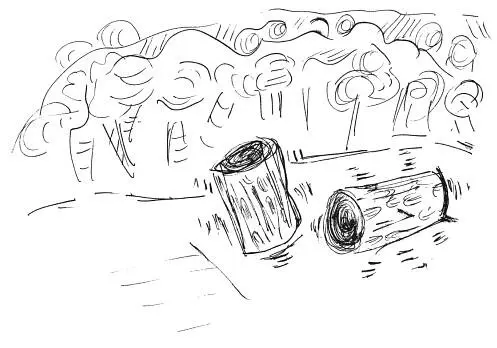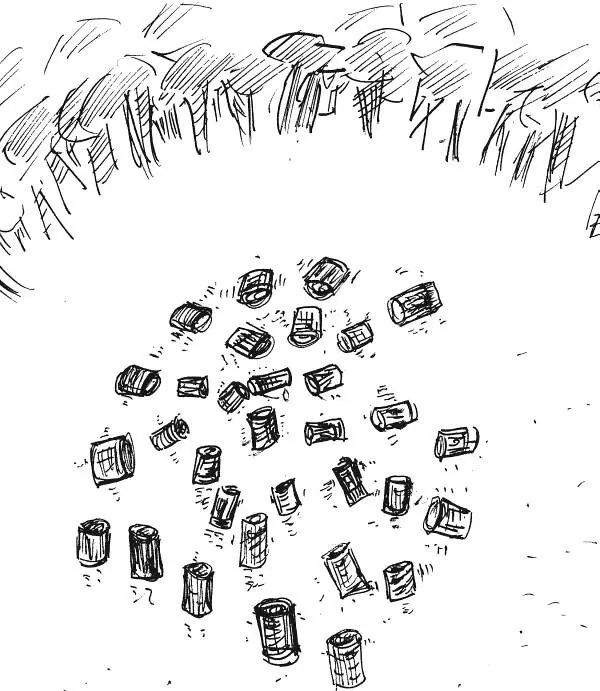
“What did all that mean except for your being tired at the end?” They went through the same long routine, though instead of ending up leaning on one another, they rolled off each other’s top ends to the ground. “You saying it’s something I can’t understand yet?” They forced themselves up by leaning against one another as they rose, bounced once and fell down. “Too bad,” and from their flat positions they bounced one of their ends. “Later, why not accompany me if you’re heading my way?” They got up, bounced five times and collapsed. “‘Accompany.’ You know. To go with someone,” and I bounced a few steps up the road, my feet coming down together each time. They got up and bounced four times. “I’m sorry, but those four bounces of yours I never figured out.” They bounced four times and stopped, repeated this fourbounces-and-stop number over and over till I said “I’m saying I still don’t know. Does it mean ‘to watch’ or ‘Listen!’ or something?” and they bounced once, stopped, bounced about ten feet up the road together and turned around and bounced back. “Then ‘walking alone’ is probably just one of you bouncing about ten feet and back?” and they bounced once. “Well, this might be a more difficult verb to explain. But how do you say ‘to sleep,’ as I can see you’re both as tired as I am,” and they fell down and didn’t move. We slept the night by the road. In the morning we set off together, the logs chattering constantly to one another as we walked. Finally I said “Nice day, hey?” as I was getting dizzy with all their bouncing and falling and rolling around me which I couldn’t understand. And also because I felt left out and wanted to learn more of their language for the time I was still with them. They bounced twice, tapped their top ends against my knees once, and took a left at the crossroad we’d come to. “Where you going?” They bounced four times and went farther along the road. “Well, it’s sure been nice knowing you,” and they fell down, rolled a little ways to me, rolled the same distance back, got up and bounced a bunch of bumps up the road without turning around again, and rolled into the woods. “Wait. Which of these roads do I take?” and I ran after them. In the woods were two other logs of the same kind of white birch tree as my couple, bouncing on the same spot faster and faster and then bouncing out to meet the logs whom I knew. When they met, they all bunked their top ends together once, so that they all touched at the same time. Then one of the logs whom I knew fell to the ground and the other log bunked its mate’s middle very hard. When the log managed to stand again, the three other logs leaned on its top end for a while. Then the two couples bounced farther into the woods. I followed them. Not only to later learn which might be the better road to avoid. But also because I’ve never been an expert on anything before. And here, out of the blue, I was becoming an expert on what was probably the one subject left that nobody was an expert on yet: the language, customs and behavior of logs. They stopped bumping along after a mile, lay down like a plus sign with all four bottom ends meeting in the middle and stayed there for about an hour. Maybe that was how they rested up after what to them might have been a long journey. Or that could be the custom or even the latest fad among logs, to sleep that way after two couples of the same tree type had either met by accident or plan. But they eventually got up and began talking. There must be sentences or topics in log language that can only be spoken through the combined movements and rest breaks of two couples instead of one. Or else some rule that forbids logs from speaking any other way but together once they meet. Because these two couples were always speaking in relation to one another and never gabbed on by themselves. For instance, after one long stop, all four logs bounced up and down ten times. Then one log bounced six times while another log swung at it and the other two logs fell down and bunked their top ends. Then these two logs rolled around at the same time but in different directions, while the other two were bouncing to and away from one another but around the rolling logs. Then three logs all at once butted the fourth log to the ground and covered part of it with leaves. The buried log dug itself out, got up on the top end of another log and bounced up and down on it, while the other two logs rolled underneath them every time this double log bounced into the air. Later, they walked a ways into the woods till they came to a lake. There, twenty-eight white birch logs of about the same length and thickness were bouncing in place faster and faster and then bumped and rolled out to meet them. When the two groups met, they went through the same greeting as the two couples before. They got in a circle and bunked top ends together, getting as close as possible to having all their top ends touching or nearly touching at the same time. Then a log from the couple my couple had met before, rammed its top end into the middle of its mate. When the struck log managed to stand again, the other thirty-one logs fell on top of it. Then without getting up, all thirty-two logs rolled into the lake. They floated to the other side and back without splashing, so I couldn’t tell whether logs speak in the water. They all started talking at once when they returned to the side I was on. Nine logs bounced together while six logs rolled around them and three logs tapped their tops on the ground and twelve of the remaining fourteen logs buried parts of the other two, and things like that. I realized that log language gets more and more complicated with the number of logs added to the conversation. It could be the most complex language there is. Maybe impossible for anyone to learn completely unless he brought all the white birch logs of the world together and for a long time watched them speak. It’s also possible that only logs of the same tree that had been cut up into logs become couples. And that if one logloses its mate for some reason, it has to find a log from that same tree who has also lost its mate. Or one from the same tree who has always been alone and speechless before because it was cut last and became the odd log. What I never learned for sure was how these couples arranged to meet here. It seemed that this information was carried from grove to grove in this forest by a couple of messenger logs. The log couple I first met, for example, as they were the only logs I saw on the road. I didn’t exactly know. These thoughts were mostly guesswork on my part, formed from the bits and pieces of conversation I was able to pick up from these thirty-two logs. The only thing I came closest to being a hundred percent sure about, was that all thirty-two logs were cut from the same tree. Not only from their conversations but because of their similar length, size around, condition of their bark and the way it peeled. I followed the sixteen couples to a forest clearing where there were hundreds of white birch logs of various lengths, girths and bark conditions. The greeting ceremony between the two groups lasted an hour because of the difficulty of getting all their top ends as close to bunking one another as they could at the same time.

But the next greeting ceremony lasted half a day when five more groups of a few hundred logs each, came bouncing and rolling through the woods from different directions to join the meeting. Their language became so complicated that I knew I’d never learn it in even a lifetime of watching them. All two thousand or so logs spoke at the same time. But to complete even the simplest sentence, about a hundred different movements were going on by separate groups and single couples and individual logs. Though whenever a stop came, it was made by all the logs together. I now felt that this gathering was a convention of the elected representatives of all the white birch groves in this forest and the surrounding ones. When they weren’t just chattering away, all the logs stood in neat long rows before four other logs. Every so often these rows bounced once or twice or five times together to some other kind of movement the four logs were making at the same time. I thought that maybe these logs reset like this from time to time to work out problems that only white birch logs in this area have, such as a special insect blight or animal or human pests. Or perhaps this was one of many similar conventions being held by logs of all the white birch trees in this country or continent on whether to band together to declare war on the logs of another type birch tree. Maybe logs are the ones who start most forest fires — as an act of strategy against nature or war to wipe out every kind of log type but their own. I also felt that as much as I wanted these questions answered and my guesswork checked out, I’d never let on I’d been following them. They might surround and stomp me if they learned I’d been watching them, afraid that any information leak about them could lead to mobs of people raiding the forests to use or sell them as pets. Or to put them in botanical garden cages so that the rest of us, who might not be so fortunate as I was to see them in their natural state, could go gaga and be educated and frightened and amused. These logs might also fear that if their meeting grounds and possible war plans became known, another type of more numerous though less clever log might unite and attack them first, to destroy them as a potential danger to all the world’s logs. That evening every log fell to the ground at the same time and just stayed there, which I remember meant the words “to sleep.” All the logs but three slept in many circles, one within another. In the center of all these circles, like a bull’s eye in a target, two logs slept side by side with a third log lying on top between them. I was tired also from no sleep for two days. I thought I’d doze off and wake up when they did and follow them till I had enough information and understanding about white birch logs to fill a book. The logs were gone when I woke up. Not a trace of them, except for a trail of bouncing and rolling marks leading to me, around me and then to a river, where they must have floated away as a single group. I tried retracing my steps back to the road where I first met the two logs, but was lost. I looked around for a couple of white birch logs to help me find my way out, since they were the only type log I could speak with. But none was around. I did trip over a three-foot-long oak log who was alone. Maybe oak logs speak also, I thought. No oak log ever spoke to me before, though maybe because I never tried speaking with them first. So I looked for another oak log of about the same length and size around, and dragged it over to the first log. “Excuse me,” I said, “but you know how I can get out of this forest?” They stayed there like the kind of logs I had always been used to till a few days ago: not moving, as if they didn’t understand a word I said.
Читать дальше














